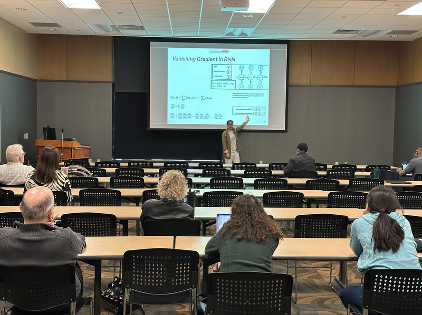RCAC Lecture Series: “Unveiling the Mystery of Deep Learning, Past, Present, and Future”—Session 3
The Rosen Center for Advanced Computing (RCAC) is excited to host an informative short course, “Unveiling the Mystery of Deep Learning: Past, Present, and Future.” This course is designed to provide those who utilize artificial intelligence (AI) tools with a deeper understanding of the technology, allowing them to innovate in the field as well as optimize their workflows.
 Deep learning has revolutionized artificial intelligence, but its journey from early theoretical foundations to modern breakthroughs has been long and complex. “Unveiling the Mystery of Deep Learning: Past, Present, and Future” is a lecture series that will explore the historical evolution of deep learning, tracing its origins from the early days of neural networks in the 1980s to its resurgence in the 2010s and 2020s. The series will be hosted by RCAC in conjunction with Purdue’s Institute for Physical AI (IPAI).Dr. Elham Barezi, an AI Research Scientist for RCAC, will lead the course. Throughout the series, participants will obtain a comprehensive understanding of what deep learning is, how it evolved, and where it is headed. The goal is to equip participants with deeper knowledge of AI’s development, enabling them to think critically about future innovations rather than just follow trends. By understanding the strengths and limitations of different deep learning techniques across time, participants will be better equipped to choose the most suitable approach for their specific problems and data. The lecture series will be split into multiple sessions, all of which will be hosted at Purdue University.
Deep learning has revolutionized artificial intelligence, but its journey from early theoretical foundations to modern breakthroughs has been long and complex. “Unveiling the Mystery of Deep Learning: Past, Present, and Future” is a lecture series that will explore the historical evolution of deep learning, tracing its origins from the early days of neural networks in the 1980s to its resurgence in the 2010s and 2020s. The series will be hosted by RCAC in conjunction with Purdue’s Institute for Physical AI (IPAI).Dr. Elham Barezi, an AI Research Scientist for RCAC, will lead the course. Throughout the series, participants will obtain a comprehensive understanding of what deep learning is, how it evolved, and where it is headed. The goal is to equip participants with deeper knowledge of AI’s development, enabling them to think critically about future innovations rather than just follow trends. By understanding the strengths and limitations of different deep learning techniques across time, participants will be better equipped to choose the most suitable approach for their specific problems and data. The lecture series will be split into multiple sessions, all of which will be hosted at Purdue University.
Session 1 and 2 was well received, with more than 80 participants taking part either in-person or online. It focused on the history of deep learning and AI in the first session, and fundamentals of deep learning (from discriminative to generative models) in the second session. For those who were unable to attend Session 1 or 2, you can review the sessions recording here.
Session 3: Transformers and Large Language Models (Upcoming)
Date: Monday, July 14
Time: 12:30 PM - 2:00 PM EST
Venue: Innovation Room at Convergence
Join us for the third session in our deep learning seminar series! Building on our previous lectures on the history of deep learning, and foundational architectures like RNNs, CNNs, autoencoders, and training techniques for deep learning models, this seminar will delve deeper into Transformers and Large Language Models (LLMs). We’ll explore advanced topics such as tokenization, positional encoding, attention mechanisms, encoder/decoder model architectures, real-world applications, and practical tips and tricks for working with LLMs. Don’t miss this opportunity to consolidate your understanding and engage in discussion on the latest in deep learning!
“Unveiling the Mystery of Deep Learning: Past, Present, and Future” is open to all Purdue faculty, staff, researchers, and students who want to improve their understanding of and ability to use AI tools in their work.
To attend the third session in the series, please register here: REGISTRATION
This event is intended to be in-person, but for those unable to make it on-site, you can join via a Teams link, here: Teams Meeting Link
For the remaining sessions in the series, input from the participants of this event will be used to determine ideal dates, times, and locations to ensure ease of access and availability for the audience.
RCAC is committed to helping Purdue make the next giant leap in artificial intelligence. We offer the physical infrastructure, education, and expert staff to support the AI work of researchers and students at Purdue. Whether you are looking to advance AI research itself or to harness the power of AI in your current projects, we have the resources you need to achieve success. To learn more about our AI-related services, please visit: https://www.rcac.purdue.edu/services/datascience
